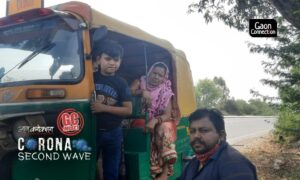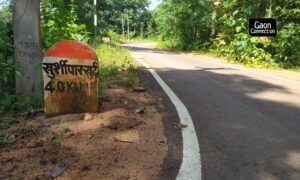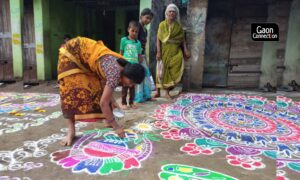Meeting Bhima
I first met Bhima (name changed), 26, in October 2018. His hair was neatly combed and jet black and he had a ready smile and a pleasing personality.
He came to pick me up at the airport in Raipur, Chhattisgarh and escorted me to the apartment where I was to stay for the duration of my trip. I remember him making poha for me. My first impressions of him were that he was cordial and friendly.
I was in Chhattisgarh to work for an NGO that had organized a peace march between October 2 and October 12, 2018. Around 200 of us – adivasis from Chhattisgarh, Andhra Pradesh, Madhya Pradesh, Telangana and Maharashtra, volunteers like me, activists, intellectuals, academicians, students and professionals from across the country — walked 184 kms in a span of 10 days. The march started from Chatti (Andhra Pradesh) and ended in Jagdalpur (Bastar). The aim of the march was to give peace a chance in a region that had witnessed mindless violence since decades and as a result of which many adivasis had lost their lives.
The peace bearer with a past
Bhima was there too, always leading us, holding the peace flag, raising peace-related slogans. The October heat was brutal, but Bhima was always cheerful, full of life. I admired his enthusiasm.
One day I was told that he was on a hit list. Bhima had briefly worked for the Naxals, when he was young and not so wise. When better sense prevailed, he switched sides and joined hands with the “police waale log”. Since then, in his own words, the Naxals had been looking for him and so were the security personnel, who would call him for questioning every now and then. I was conscious never to ask him about his life that once was. But something that he said stayed with me even after I left Chhattisgarh. “Adivasis ko bhi jeene ka haak hai. Wo fokat me maare jaate hai. Mere se jo ban payega, me karunga. (Adivasis have a right to live too. They are getting killed for no fault of theirs. I will do what I can from my end to help them).
A year later, the conversation continues
I happened to visit Chhattisgarh again in February 2019 for work. I met Bhima again. This time I asked him if he would like to share his story. He readily agreed. I asked him if an interview would land him in any trouble. He thought for a while and said, “Kuch nahi hoga.” (Shouldn’t be a problem).
We sat under a tree on the outskirts of Raipur. There was no hint of civilization for miles on end. Bhima began telling me about his plans for his future just as the sun had begun to set, setting the skies ablaze in hues of oranges and reds. He swore never to get caught between the Naxals and the security forces again. He said he wanted to complete his post-graduation in “soshal saince” (social science) and work for the adivasis.
In his eyes, I saw determination and hope and realized that his story needed to be told and deserved to be heard. For it is when we hear these stories, without judgement and with empathy, that we can truly make a beginning.
Listen to the audio interview here:
Edited excerpts:
My story in my own words
My name is Bhima Kunjam. I live in a village in Dantewada (village name withheld). When I was young, I would see children going to school. I begged my father to send me to school as well. I wanted to study. There was a village nearby (name withheld). My father took me there one day and got me admitted in a primary school. The next day I asked my father to buy me a school bag, pen, copies and a notebook. My father took me to the ‘Wednesday market’ in my village and bought me everything that I wanted. I would go to the school every day and come back home to study and revise what I had learnt during the day. My father was also happy that his son was going to school.
My wish list – computers and English
After about two or three months, my teacher said that since I was a good student, I should be promoted from class one to class four. I studied for a year in class four and was promoted to class five. I would only study and not do any household work. After completing class five, we went to Bailadila (which is in Kirandul town in Dantewada) to secure admission in a school which also had a hostel.
But since I had cleared class five in the third division, I couldn’t get admission to that school. There was a high school in a village close by (name withheld). I got admission there and joined class six. I remember that after school we would go to see cock fights. It would a popular village pastime. We would bet Rs 5-10. On some days we would win, on others, we would lose.
I told my father I was interested in learning computers and English. There was a typing shop in Bailadila. I started going there. It was 10 kms away. I would cycle and come back at around 6-7 in the evening.
This was in 2003-2004, I think. By that time, the Naxal violence had escalated in the region.
A stray encounter and my life changes
One day while returning home, I saw that the trees near my villages were cut into pieces. Two Naxals, wearing their uniforms, were sitting there. They stopped me and asked me for my address. I told them my name and the name of my village. I also told them that I was returning from my typing class in Bailadila. There were typing papers in my cycle carrier. I showed them those sheets.
Soon, they started calling some of us to their meetings. One day a meeting was conducted at a village close by (name withheld). We were playing cricket when we were called there. When we reached there, we found five people, including two girls, waiting for us. They were all Naxals.
We tried to hide in the crowd as we were scared, but they asked us to sit in the front row. They asked us if we were educated and told us in no uncertain terms that we had to fight.
They distributed pamphlets which mentioned the Naxal ideology. Around 12 of us, including girls, from our village joined them. Soon, I was appointed as a leader. My job was to visit villages and to urge people to save our ‘Jal, Jungle, Zameen’. I would tell them that the government is taking over the coal mines and it is taking our land away. I would also tell them how innocent people are getting killed and we will have to fight for our rights because the politicians won’t fight for us. The Naxals instructed us to beat the security personnel up should we come face to face with them as they had started raiding villages by then. I wasn’t a good orator. My father would help me draft my speeches.
Caught in the web
I was their favourite. The leaders even sent me to the market to buy things for them. For a long time, I was in their good books. They gave me books to read and were impressed with my work. I would walk 10-12 kms at any time of the day when they would call me. Even the villagers started respecting me.
In the meantime, I cleared my class eight exam. I wanted to go out to study and clear class 10. But my leaders refused to send me out even after I told them that I would continue to work for them. After much reluctance, they relented.
I studied in a school in a village (name withheld), but I couldn’t clear my 10th. My father was very upset and scolded me. My leaders were also very angry as they thought I had sided with the police. I started attending their meetings again. Meanwhile, the police started doing the rounds of my house. I stopped going home. I would sleep at my friend’s place. I stopped going to the market as well.
Of lies, deceit and being let down
One day, the Naxals killed my cousin as they thought he had joined Salwa Judum (a militia that was mobilised and deployed as part of anti-insurgency operations in Chhattisgarh aimed at countering Naxalite violence in the region). I was furious that they didn’t even bother to check with me once before taking the extreme step.
I was practically homeless. That’s when I thought about the teacher who used to come in his van and cross the highway every day. One day I stopped him and told him that the Naxals had killed my brother and I wanted to see the police.
The driver informed the station in-charge at Kirandul police station. They asked the driver to get me to the station. I went there after two-three days. They had many questions. I told them everything, with honesty and with trust, holding nothing back. I also told them that the Naxals had killed my cousin. They wanted to know if I wanted to work for the Naxals again. I refused. I told them that the Naxals were harassing my family and were looking for me.
They continued to call me for a month and noted everything down. I worked for them for the next two years. I would inform them about the whereabouts of the Naxals – that is, when they were scheduled to meet in the jungle. I gave them a list of names. I told the police to kill them all as they were not letting children study and were not letting roads to be constructed for better connectivity either.
I met all the senior officials while I was working for them, but didn’t get enough support. I realized they were using me. It was frustrating, so I went to Dantewada to study privately. I cleared my 10th in second division. Meanwhile, someone from the IB (Intelligence Bureau) contacted me. They lured me to work for them, but I had made up my mind by then. I started working as a laborer.
Odd jobs and working for an NGO – of turning points and new beginnings
One day, my father scolded me for not getting good marks in class 10. I was upset. I sat in a train and ran away to Vishakhapatnam. After two days, my family started looking for me. They thought that the Naxals had killed me. They traced me to Vishakhapatnam and urged me to come back.
I returned and went to the Adivasi Gondwana Bhavan in Bailadila as I didn’t have any money. My family came there to pick me up. My father hugged me and cried.
I starting doing odd jobs to earn money. But sometimes, the Naxals would harass me and sometimes the security forces would call me for questioning. One day I met a reporter, who asked me if I wanted to go to Bhopal and work for an NGO. I went without informing my parents. This was in 2013.
I was happy here. For the first time in my life, I saw a laptop. They would let me touch it. I wanted to learn. I met a lot of interesting people. My family kept calling me back. They would deposit money in my account, but I refused to take it. After working for a few years, I moved back to Chhattisgarh after the NGO shifted base to Raipur. I have been working here since then.
What I dream of? Of change and a way forward
I have come a long way, but some things have not changed. The Naxals are still killing adivasis and the security personnel are killing them too. No one wants to find a solution to the problem. The Naxals allege that the adivasis are police informers. The security personnel raid our villages and kill us or detain us alleging we work for the Naxals. The Naxals in turn claim that they are fighting for the ‘Jal, Jungle and Zameen’, but they are not in the right direction. They are just using the adivasis. The police are also using the adivasis. They “recruit” these adivasis and send them to the jungles. When the clashes happen, it’s the adivasis who get killed both on the police side and on the Naxal side. I am doing my BA. I want to join an NGO, start a business and help these adivasis.



















